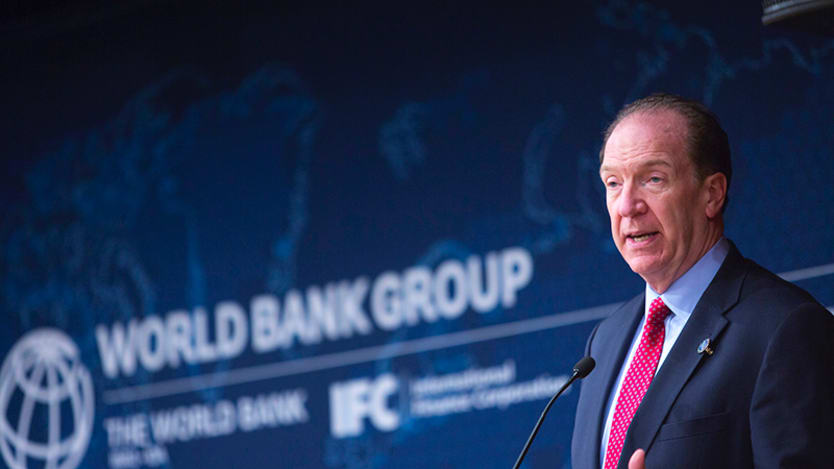
WASHINGTON — World Bank President David Malpass thinks the development community should spend less time at conferences and more time helping countries achieve broad-based economic growth.
Speaking at McGill University in Montreal, Canada, in advance of the bank’s annual meeting next week in Washington, D.C., Malpass described some of the priorities he has set for the institution in his first six months at its helm. As he has from the outset of his tenure, Malpass emphasized the bank’s country-based efforts — while adding more details about initiatives around development policy coordination and debt transparency.
“In all these efforts, we work hard to cooperate with international development partners. There’s been a degree of progress in this regard, although I have to say sometimes this cooperation involves too many development conferences and international working groups,” Malpass said.
World Bank names veteran staffer as new managing director
The World Bank has named Axel van Trotsenburg, the institution's longest-serving vice president, as its new managing director. Devex spoke to him about his priorities shortly after the announcement.
One way to accelerate this progress is through better development policy coordination at the country level, Malpass said. He added that the World Bank is working to help stand up “country platforms” that can “help countries prioritize their key development issues and get development financiers, including non-traditional donors and the private sector, engaged in the most constructive way.”
The bank is currently working with 11 countries to put these platforms into place, Malpass said, reiterating his call for less talking and more doing.
“There continue to be many international groups setting up discussion groups on how to define, standardize, centralize, and instruct country platforms, but the strong view of the World Bank Group is that it’s time to move forward. There’s been ample discussion, and the next step is to help countries organize in-country meetings to prioritize their activities with major donors,” he said.
These platforms will be “tailored to the countries and their needs,” Malpass said, and “will be particularly focused on private sector involvement and engagement.”
Malpass also drew attention to rising levels of debt in some low- and middle-income countries, an issue that is expected to feature in conversations about the replenishment of the International Development Association, the bank’s fund for low-income countries. Malpass noted that public debt in low-income and emerging economies has risen to the highest levels since the 1980s, and he drew particular attention to his concern that much of that debt lacks transparency — a worry frequently echoed by critics of China’s development lending practices.
“We’ve found that less than half of the countries we’ve reviewed meet minimum requirements for debt recording, monitoring, and reporting. Lenders need to be more transparent, eliminating confidentiality clauses in their lending to sovereign borrowers,” Malpass said.
The bank chief suggested that the institution’s lending will be increasingly tied to actions countries take to achieve greater transparency around debt.
“Our development policy financing, which disburses against impactful prior policy reforms, will increasingly play a role in encouraging more transparent and sustainable borrowing practices as well as more effective and efficient public spending, so that citizens can see their government’s obligations and the use of proceeds,” Malpass said.
Malpass framed his remarks around addressing “the urgency of growth in developing countries,” which he views as the surest — and perhaps only — way to end extreme poverty and boost shared prosperity.
“To achieve these gains requires electricity and clean water, as well as progress on the rule of law, health, nutrition and education, the full inclusion of girls and women, full attention to the environment, climate and private-sector conditions, and improvements in the government’s spending, tax, and infrastructure policies,” he said.
Malpass concluded his remarks with a physics joke — inspired by McGill University graduate and nuclear physicist Ernest Rutherford — which gave some indication of his attitude toward the upcoming slew of meetings and side events that will take place at the World Bank’s headquarters next week.
“I’ve tried diligently to counteract the tendency of the annual meetings to expand to fill all available space, but I recognize the strength of inertia,” he said.








